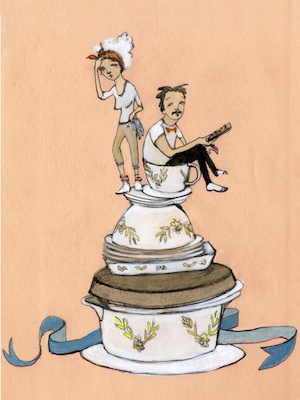5 Ways to Avoid Post-Wedding Blues
There is a day in every bride’s future: the day when the dress will be packed in storage, the bouquet will begin to dry, and all that remains of a blissful wedding- planning haze will be a stack of blank thank-you cards and three too many ceramic gravy boats. After the giddy excitement that comes with Big Day planning (not to mention the attention, fun, and constant connection to loved ones), it’s no wonder many brides—er, wives—find themselves suffering from post-wedding blues. To help you fend off a case of the marital mondays before they even have a chance to set in, we talked with Melissa Paul, Philadelphia planner extraordinaire, and local psychologist Cindy Baum-Baicker, to get their do’s and don’ts for battling the blues. Here are their tips:
The number one reason women fall into despair after a wedding, says Paul, is that they suddenly fall out of touch with all the wedding-team players—parents, family and friends. “Don’t just disappear,” she says. “Get back in touch with everyone, say thank-you, and share your honeymoon experience.”
Schedule things to look forward to in the time after your wedding, like dinner parties where you can use all that registry loot, or even a mini-trip six months into the first year. “it doesn’t have to be an exotic vacation,” says Baum-Baicker. “it can be an inn in Bucks County, or New York for the weekend. just have something to look forward to.”
In the months leading up to the wedding, “Ask yourself, ‘Does either of us have a history with depression? Trouble with transitions? anxiety?’ says Baum- Baicker. “if so, be mindful of that going forward.” if you can see potential mood swings coming, you’ll be better able to keep them in perspective.
To stay in touch with your wedding-free real life, “couple time” is the name of the game, even during the height of wedding planning. Paul suggests taking one day a week where “wedding” is a four- letter word. Watch TV, go to the movies, pack a picnic, do anything but talk wedding. Cue your parents in, too, so they don’t call with pesky planning questions.
From the day the ring appears on your finger, fight the urge to schedule other big changes around the wedding. It may seem like a natural time to quit a job, buy a house or start the baby talk, but Paul says this kind of major planning is a recipe for overload—emotionally, and financially: “It’s just too much for the psyche. You have to take one thing at a time.”
Getting married? Start and end your wedding planning journey with Philadelphia Weddings' guide to the best wedding vendors in the city.



